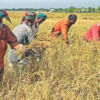Supply crisis: Govt to buy MOP fertiliser from Canada

Bangladesh is likely to buy the bulk of its muriate of potash (MOP) from Canada and other countries to meet its requirement for 7.5 lakh tonnes of the chemical fertiliser to produce rice and other crops for the next fiscal year, said officials of the agriculture ministry yesterday, dispelling concerns of a shortage due to the war in Ukraine.
The ministry already awarded contracts to private bidders to buy 2.27 lakh tonnes of the MOP from the international market. It has almost finalised the process of buying another 4 lakh tonnes from Canada under a state-to-state arrangement.
"We will face no crisis of fertiliser, no chance," said Agriculture Secretary Md Sayedul Islam.
Bangladesh does not produce the MOP although state factories produce 10 lakh tonnes of urea and insignificant quantities of triple super phosphate (TSP) and diammonium phosphate.
It used to import roughly 75 per cent of its requirement for the crop production ingredient from Russia, Belarus and the rest from Canada, said Islam.
The Russia-Ukraine war, which broke out by the end of February this year, created concerns amidst sanctions on Russia and Belarus on whether farmers would have the MOP fertiliser available to grow rice, potato and other crops in the next fiscal year of 2022-23 beginning from July.
To secure supplies of the fertiliser, the government floated a tender early this month.
Bangladesh consumed over 55 lakh tonnes of fertiliser until this fiscal year and it met most of the demand to produce foods from Saudi Arabia, Morocco, Tunisia, Egypt, China, Lebanon and Qatar apart from Canada, Russia and Belarus, said agriculture ministry officials.
The main season for use of fertiliser begins from November and continues until February when Boro, the largest crop, is grown.
"It is true that prices of fertiliser have increased due to the war. However, we are at a comfortable position in ensuring availability of fertiliser for farming the next fiscal year," said Sheikh Bodiul Alam, deputy chief for fertiliser management and monitoring wing at the ministry.
Officials said the concern over the supply of the MOP has been created after the war as the nation depended on Russia and Belarus for the ingredients. Sources of supply of other fertilisers remained unaffected.
The agriculture ministry projects a requirement for 55.5 lakh tonnes of chemical fertiliser for the fiscal year of 2022-23 although high prices of the ingredients are expected to increase the state's subsidy expenditure to provide the input to farmers at reduced prices.
The government has allocated Tk 15,000 crore as subsidy for the fiscal year of 2022-23, up from a revised allocation of Tk 12,000 crore in the current fiscal year.
The agriculture ministry estimates that the total subsidy bills would amount to Tk 25,000 crore to Tk 30,000 crore this fiscal year.
Alam said the state also has a good stock of 15.5 lakh tonnes of fertiliser, including 2.5 lakh tonnes of the MOP.
"There will be no crisis of MOP," said Riaz Uddin Ahmed, executive secretary to Bangladesh Fertiliser Association, adding that private firms already took steps to import around 2 lakh tonnes from Canada and Jordan.

 For all latest news, follow The Daily Star's Google News channel.
For all latest news, follow The Daily Star's Google News channel. 









Comments